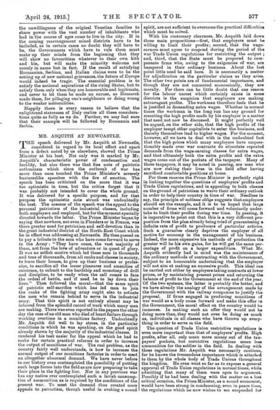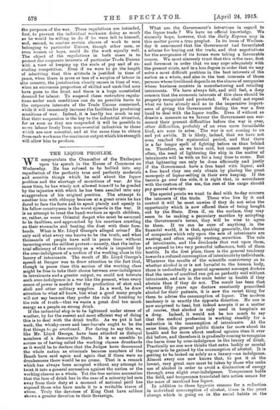MR. ASQUITH AT NEWCASTLE.
THE speech delivered by Mr. Asquith at Newcastle, considered in regard to its local effect and apart from a defect noted by us elsewhere, showed the Prime Minister at his best. Not only was it marked by Mr. Asquith's characteristic power of condensation and lucidity, but also there was that fine note of patriotic enthusiasm which since the outbreak of war has more than once touched the Prime Minister's severely businesslike speeches with the fire of emotion. The speech has been criticized on the score that it was too optimistic in tone, but the critics forget that it was probably not intended to cover the whole ground. It was delivered for a specific purpose, and for that purpose the optimistic note struck was undoubtedly the best. The essence of the speech was the appeal to the personal patriotism of the industrial classes, including both employers and employed, but for the moment specially directed towards the latter. The Prime Minister began by saying that nowhere, not even in Flanders or in France, was there greater need for patriotism and self-devotion than in the great industrial district of the North-East Coast which he in effect was addressing at Newcastle. He then passed on to pay a tribute to the men who have come forward to serve in the Army: "They have come, the vast majority of them, not from the love of adventure or in quest of glory. It was no selfish motive which led these men in thousands and tens of thousands, from all ranks and classes in society, to leave their homes, to give up their business or profes- sion, to sacrifice all the lesser pleasures and amenities of existence, to submit to the hardship and monotony of drill and discipline, to be ready when the call comes to face the ordeal of battle, and if need be to lay down their lives." Then followed the moral—that the same spirit of patriotic self-sacrifice which has led men to join the ranks of the fighting army ought also to actuate the men who remain behind to serve in the industrial army. That this spirit is not entirely absent may be inferred from the splendid record of work which many men are making. There was even reported in the papers the other clay the case of an old man who died of heart failure through working overtime in a munitions factory. Undoubtedly Mr. Asquith did well to lay stress, in the particular conditions in which he was speaking, on the good spirit already shown by the majority of the industrial classes. It rendered his task easier for the appeal which he had to snake for certain practical reforms in order to increase the output of munitions of war. The real problem, as the country fairly well understands, is how to increase the normal output of our munitions factories in order to meet an altogether abnormal demand. We have never before in our history even contemplated the possibility of putting such large forces into the field as are now preparing to take their place in the fighting line. Nor in any previous war
has any nation ever contemplated such a lavish consump- tion of ammunition as is required by the conditions of the .present war.. To meet the demand thus created mere /appeals to patriotism, though useful in evoking a sound spirit, are not sufficient to overcome the practical difficulties which must be solved.
With his customary clearness, Mr. Asquith laid down three main propositions—first, that employers must be willing to limit their profits ; second, that the wage- earners must agree to suspend during the period of the war Trade Union regulations for restricting the output ; and, third, that the State must be prepared to com- pensate firms who, owing to the exigencies of war, are hampered in their ordinary business. About the last point little need be said here. It is necessarily a matter for adjudication on the particular claims as they arise. The other two points are of fundamental importance, and though they are not connected economically, they are morally. For there can be little doubt that one reason for the labour unrest which certainly exists in some districts is the suspicion that employers are making extravagant profits. The workman therefore feels that lie is justified in demanding extra wages. Whether in normal times the workman in the long run has any ground for resenting the high profits made by his employer is a matter that need not now be discussed. It might perfectly well be argued, on the other side, that the high profits of the employer tempt other capitalists to enter the business, and thereby themselves lead to higher wages. For the moment, however, all we have to deal with is the undoubted fact that the high prices which many employers have unques- tionably made over war contracts do stimulate repeated demands from the wage-earning classes for extra wages, and that ultimately both the extra profits and the extra wages come out of the pockets of the taxpayer. Many of these taxpayers, it may be noted in passing, are men who are now risking their lives in the field after having sacrificed comfortable positions at home.
For these reasons the Prime Minister is perfectly right in linking together the questions of employers' profits and Trade Union regulations, and in appealing to both classes on the ground of patriotism to waive their ordinary outlook in order to help their country in time of war. Needless to say, the principle of noblesse oblige suggests that employers should set the example, and it is to be hoped that large number of firms will come forward and voluntarily under- take to limit their profits during war time. In passing, it is imperative to point out that this is a very different pro- position from the plan already being tried of guaranteeing a definite rate of profit to producers of particular articles. Such a guarantee clearly deprives the employer of all motive for economy in the management of his business. Indeed, the more expensive his methods of production the greater will be his own gains, for he will get the same per- centage of profit on a larger expenditure. What Mr. Asquith evidently had in mind was the maintenance of the ordinary methods of contracting with the Government, subject to an honourable undertaking that the employer will not aim at making an excessive profit. This ideal can be carried out either by employers taking contracts at lower prices, or by maintaining present prices and returning the balance of profit to the Government at the end of the year. Of the two systems, the latter is probably the better, and we have already the analogy of the arrangement made by the Government with the railway companies to justify the proposal. If firms engaged in producing munition, of war would as a body coins forward and make this offer to the Government, the moral effect on the country would be immense. In making such an offer they would not be doing more than, they would not even be doing as much as, individuals in all classes who have thrown up every- thing in order to serve in the field.
The question of Trade Union restrictive regulations is even more important than that of employers' profits. High profits, after all, only mean more money out of the tax- payers' pockets, but restrictive regulations mean less ammunition for the soldier in the field. In dealing with these regulations Mr. Asquith was necessarily cautious. for he knows the tremendous importance which is attached to them by the whole body of Trade Unions throughout the kingdom. He even went so far as to express a general approval of Trade Union regulations in normal times, while admitting that many of them were open to argument.
Possibly if he had been dealing with the matter ou a less critical occasion, the Prime Minister, as a sound economist, would have been strong in condemning, even in peace time, the regulations which he now wishes to see suspended fur the purposes of the war. These regulations are intended, first, to prevent the individual workman doing as much as he would be willing to do if be were left to himself, and, second, to confine certain classes of work to men belonging to particular Unions, though other men, or even women or boys, could do the work equally well. The object of the regulations in both cases is to protect the corporate interests of particular Trade Unions with a view of keeping up the scale of pay and of ex- cluding competition. Even if we were to go the length of admitting that this attitude is justified in time of peace, when there is more or less of a surplus of labour in tthe country, the justification clearly ceases in time of war, when an enormous proportion of skilled and unskilled men have gone to the front and there is a huge unsatisfied demand for labour. To suspend these restrictive regula- tions under such conditions can do no possible harm to the corporate interests of the Trade Unions concerned, while it will immensely increase the facilities for producing munitions of war. Indeed, it is hardly too much to say that their suspension is the key to the industrial situation, for as soon as they are suspended it will be possible to move labour freely from non-essential industries to those which are now essential, and at the same time to obtain from each workman the maximum output which his strength will allow him to produce.















































 Previous page
Previous page